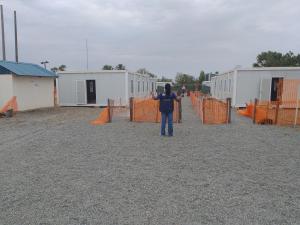Enhancing COVID-19 response in South Sudan
Juba – The World Health Organization (WHO) is working with South Sudanese health authorities to expand capacity and infrastructure at the Infectious Disease Unit in the capital Juba to help enhance the country’s emergency response to COVID-19.
The work will see the number of beds at the Dr John Garang Multipurpose Infectious Diseases Unit (IDU) increased to 80 from the current 24. A temperature controlled dispensing pharmacy and a fully equipped laundry to bolster infection prevention and control will also be established. The work began on 13 April and is expected to be finalized in early May.
“Thanks to WHO, the expansion of the Infectious Diseases Unit is an incredible team effort, bringing together partners to separate patients with respiratory symptoms so they are not waiting among other patients seeking care,” said Dr Angok Gordon, Incident Manager for the COVID-19 response at the Ministry of Health.
The Dr John Garang Infectious Diseases Unit was opened in December 2018 as part of South Sudan’s Ebola emergency preparedness and response efforts after the disease erupted in the Democratic Republic of the Congo.
Several African countries are repurposing Ebola preparedness infrastructure and have retrained emergency response personnel who had been readied for Ebola to now tackle the COVID-19 pandemic. WHO is supporting countries across Africa to better respond to the new virus. A recent consignment of medical equipment and other supplies has been shipped to several countries across the continent.
“Expanding and equipping healthcare facilities is fundamental to protect both patients and staff,” said Dr Olushayo Olu, WHO representative in South Sudan. “The expansion of the IDU establishes a tertiary health facility capable of delivering quality healthcare services and ensures adequate protection of staff, patients and prevention of environmental contamination.”
The Infectious Disease Unit was designed and equipped to enhance supportive care which is currently the hallmark of treatment for COVID-19 patients, as there is no specific treatment for the virus to date.
The facility was constructed by WHO in collaboration with the Ministry of Health. The Unit also serves as a training and simulation facility to build national capacity in management of infectious diseases.
WHO is also supporting the Ministry of Health in ramping up COVID-19 response, including surveillance, laboratory testing procurement of supplies as well as training health workers.



